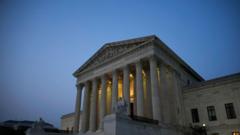A contentious ruling by Judge Brian Murphy has halted the deportation plans of eight men to South Sudan, which he states violates an existing court order that permits these individuals to challenge their removal. The judge ordered U.S. authorities to retain custody of the migrants, emphasizing that they have not been afforded a fair chance to object to their deportation. The Department of Homeland Security maintains they are expelling "uniquely barbaric monsters," but the legal dispute centers around compliance with due process rights. Tensions escalate as the judge considers holding officials in contempt, while the presence of serious concerns about executing such deportations looms.
Federal Judge Halts Deportations to South Sudan, Citing Court Violations

Federal Judge Halts Deportations to South Sudan, Citing Court Violations
A federal judge asserts that deportations of eight men to South Sudan breach his court order, allowing migrants to contest removals.
Judge Brian Murphy has delivered a pivotal ruling regarding the deportation of eight men to South Sudan. In a recent court session, he stated that such actions "unquestionably" conflict with his established order which requires that migrants be granted an opportunity to see legal recourse against being sent to countries that are not their own.
This ruling came after the Department of Homeland Security was found attempting to deport these individuals labeled as "uniquely barbaric monsters," having been convicted of heinous crimes including murder and sexual assault. At a hearing, Judge Murphy expressed that he did not view the deportees as having received a “meaningful opportunity” to challenge their removals.
Justice Department attorneys argued that the orders issued were unclear, leading to what they described as a "misunderstanding." Despite this, the judge conveyed his disapproval of the government's actions, scheduling an immediate hearing upon learning that the migrants were to be removed from the U.S.
The deportation flight was confirmed to have landed, yet specifics about its destination were not disclosed due to significant operational concerns. Among the deported individuals was Nyo Myint from Myanmar, whose legal representative noted that conflicting deportation notices led to uncertainty regarding his whereabouts.
While the U.S. government claims it has the right to send criminal aliens to third countries, tension is palpable as Judge Murphy considers the potential contempt actions against Homeland Security officials. Immigration advocates continue to stress the need for due process, arguing that these individuals, despite their criminal pasts, must still be afforded basic legal rights.
This ruling came after the Department of Homeland Security was found attempting to deport these individuals labeled as "uniquely barbaric monsters," having been convicted of heinous crimes including murder and sexual assault. At a hearing, Judge Murphy expressed that he did not view the deportees as having received a “meaningful opportunity” to challenge their removals.
Justice Department attorneys argued that the orders issued were unclear, leading to what they described as a "misunderstanding." Despite this, the judge conveyed his disapproval of the government's actions, scheduling an immediate hearing upon learning that the migrants were to be removed from the U.S.
The deportation flight was confirmed to have landed, yet specifics about its destination were not disclosed due to significant operational concerns. Among the deported individuals was Nyo Myint from Myanmar, whose legal representative noted that conflicting deportation notices led to uncertainty regarding his whereabouts.
While the U.S. government claims it has the right to send criminal aliens to third countries, tension is palpable as Judge Murphy considers the potential contempt actions against Homeland Security officials. Immigration advocates continue to stress the need for due process, arguing that these individuals, despite their criminal pasts, must still be afforded basic legal rights.




















